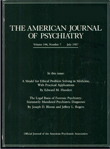The uses of hopelessness
Abstract
If most emotional problems, like most medical problems, are caused by bad luck as well as by factors over which man has control, then those who suffer from such problems must accept a burden of helplessness. When patients and their families overuse theories of causality to avoid accepting their helplessness and to create an illusory sense of human control, unjust assignment of responsibility and excessive expectations for change may erode self-esteem and make change more difficult. The authors present examples of interventions that challenge the overuse of theories of causality. Although these interventions aroused hopelessness, they also fostered realistic hope and change.
Access content
To read the fulltext, please use one of the options below to sign in or purchase access.- Personal login
- Institutional Login
- Sign in via OpenAthens
- Register for access
-
Please login/register if you wish to pair your device and check access availability.
Not a subscriber?
PsychiatryOnline subscription options offer access to the DSM-5 library, books, journals, CME, and patient resources. This all-in-one virtual library provides psychiatrists and mental health professionals with key resources for diagnosis, treatment, research, and professional development.
Need more help? PsychiatryOnline Customer Service may be reached by emailing [email protected] or by calling 800-368-5777 (in the U.S.) or 703-907-7322 (outside the U.S.).



